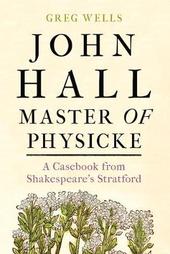
|
John Hall, Master of Physicke: A Casebook from Shakespeare's Stratford
Hardback
Main Details
| Title |
John Hall, Master of Physicke: A Casebook from Shakespeare's Stratford
|
| Authors and Contributors |
By (author) Greg Wells
|
|
By (author) Paul Edmondson
|
| Physical Properties |
| Format:Hardback | | Pages:360 | | Dimensions(mm): Height 234,Width 156 |
|
| Category/Genre | Literary studies - c 1500 to c 1800 |
|---|
| ISBN/Barcode |
9781526134530
|
| Classifications | Dewey:822.33 |
|---|
| Audience | |
|---|
| Illustrations |
39 black & white illustrations, 25 colour illustrations, 3 tables
|
|
Publishing Details |
| Publisher |
Manchester University Press
|
| Imprint |
Manchester University Press
|
| Publication Date |
10 February 2020 |
| Publication Country |
United Kingdom
|
Description
This is the first complete edition and English translation of John Hall's Little Book of Cures, a fascinating medical casebook composed in Latin around 1634-5. John Hall (1575-1635) was Shakespeare's son-in-law (Hall married Susanna Shakespeare in 1607), and based his medical practice in Stratford-upon-Avon. Readers have never before had access to a complete English translation of John Hall's casebook, which contains fascinating details about his treatment of patients in and around Stratford. Until Wells's edition, our knowledge of Hall and his practice has had to rely only on a partial, seventeenth-century edition (produced by James Cooke in 1657 and 1679, and re-printed with annotation by Joan Lane as recently as 1996). Cooke's edition significantly misrepresents Hall by abridging his manuscript (Cooke removed Hall's conversations with his patients), by errors of translation, and by combining Hall's work with examples from Cooke's own medical practice. -- .
Author Biography
Greg Wells practised as a consultant in public health within the N.H.S. He received his MA and PhD from The University of Warwick Paul Edmondson is Head of Research for the Shakespeare Birthplace Trust -- .
Reviews'a remarkable piece of scholarship that goes beyond quaintness and unintended humour (no pun intended) to offer a convincing composite portrait of a society pitched between atavism and modernity.' Brian Morton, TLS -- .
|